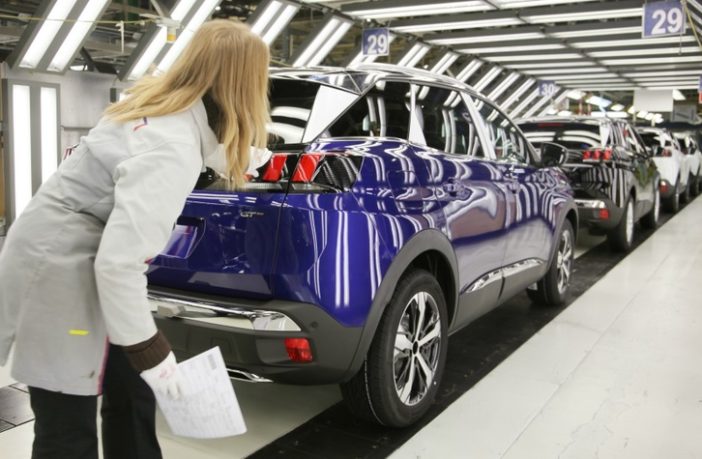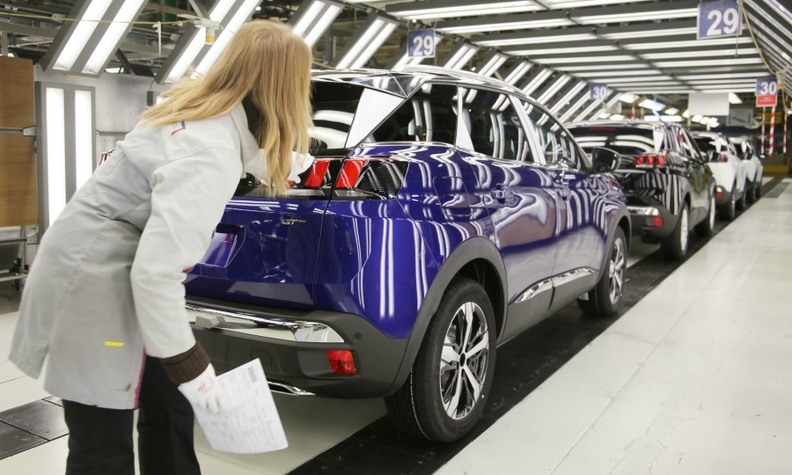Automotive News Europe
A worker examines a Peugeot 3008 SUV at the automaker’s plant in Sochaux, France.
Critics of PSA Group’s acquisition of Opel/Vauxhall said Carlos Tavares would have to either lay off thousands of workers, close plants or do both to make the former General Motors unit profitable.
Two years later, Opel’s workforce has been reduced only by about 10 percent to 15 percent, largely through attrition and buyouts. Capacity utilization is on an upward trend, even though sales volumes have dropped at Opel.
PSA assembly plants are running at about 75 percent capacity on average, just inside the margin considered to be profitable, said Justin Cox, a production analyst at LMC Automotive. By 2022 that rate is projected to increase to 85 percent, a figure that will be reached through “repatriation” of models that had been built elsewhere or by other automakers under contract or through joint ventures, Cox said.
Among the models that are expected to help fill PSA factories in Europe are the Opel/Vauxhall Mokka X, a strong-selling small SUV with an average annual volume of about 150,000. The Mokka X had largely been produced at GM’s factory in Bupyeong, South Korea. The next Mokka will have a PSA architecture and will likely be built in Poissy, France.
Production of Opel’s revamped light commercial van lineup, including the Combo, Vivaro and Movano, is being transferred to PSA factories, with the Combo added to plants in Portugal and Spain; the Vivaro at Luton, England; and the Movano eventually going to Gliwice, Poland. PSA will supply versions of its compact vans to Toyota, deepening the collaboration between the automakers in Europe.
“At first I thought Tavares would have to do drastic surgery on his footprint because he has too many factories that are not making enough cars,” Cox said. Tavares has a plan to boost capacity utilization, “even if he has had to do some trimming” at some plants, including reducing the number of production lines and shifts, he said.
Among the plants that have shown sharp utilization rate increases under Tavares are Rennes, France, which went to 45 percent in 2018 from 25 percent in 2016; Zaragoza, Spain, to 98 percent from 79 percent; and Sochaux, France, to 118 percent from 83 percent.
In fact, four of 14 PSA factories in Europe are operating at 100 percent capacity or higher, including lower-wage sites in Trnava, Slovakia, and Mangualde, Portugal. PSA will start production of the Peugeot 208 at a new factory in Kenitra, Morocco, this year.
Volumes have fallen, however, at former GM plants — Luton and Ellesmere Port in the UK; Opel’s German plants at Ruesselsheim and Eisenach; and at Gliwice.
“Tavares is quite happy to let sales and production fall so that they don’t have these huge inventories that they have to discount or sell at a loss or very low margins,” Cox said.
Tavares has said GM plants were much less efficient than PSA’s, which have been sharpened by internal competition for products.
“Most automakers do it, but PSA takes the internal competition between plants to another level,” said Philippe Houchois of Jefferies. “I’m sure it’s a bit tense — you are only as safe as the life cycle of the product.”








